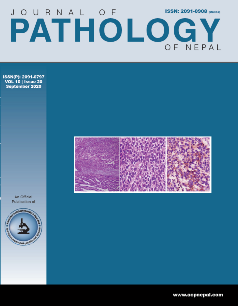Serum anti-thyroid peroxidase antibody in infertile Nepalese women: a hospital-based study
DOI:
https://doi.org/10.3126/jpn.v10i2.27267Keywords:
Anti-thyroid peroxidase; Autoimmune; Infertility; Thyroid diseaseAbstract
Background: Infertility is a critical component of reproductive health that can precipitate agony for a couple. Antibodies against thyroid peroxidase can lead to not only autoimmune thyroiditis which is highly prevalent in women, but may also represent a generalized autoimmune milieu in our body that can be associated with infertility. This study aims to assess anti-thyroid peroxidase antibodies in female patients with infertility.
Materials and Methods: This is a cross-sectional study carried out in the Department of Biochemistry, Tribhuvan University Teaching Hospital over three months (November 2018 to January 2019). All women undergoing work up at the infertility clinic with reported normal thyroid function and otherwise normal levels of reproductive hormones were recruited for this study. Anti-thyroid peroxidase levels were estimated in their serum samples by enzyme-linked immunosorbent assay.
Results: Of the eighty-seven females that were selected for the study, 54 were infertile females, 16 were pregnant women in their first trimester and 17 were non-pregnant females in their reproductive age. Four positive cases of anti-thyroid peroxidase were detected among infertile females (7.4% within the group), 2 amid non-pregnant females (11.76% within-group) while no positive cases were detected within the pregnant group. However, the occurrence was not statistically significant (p=0.4). The pregnant group showed higher mean anti-thyroid peroxidase levels compared to both infertile and non-pregnant females though statistical significance could not be established (p=0.066).
Conclusions: Functional autoimmune antibodies, like anti-thyroid peroxidase levels, do not have a significant primary association with infertility.
Downloads
Downloads
Published
How to Cite
Issue
Section
License
This license enables reusers to distribute, remix, adapt, and build upon the material in any medium or format, so long as attribution is given to the creator. The license allows for commercial use.




